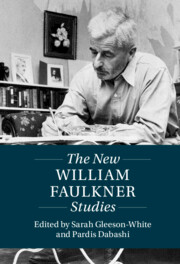12 results
Index
-
- Book:
- The New William Faulkner Studies
- Published online:
- 23 June 2022
- Print publication:
- 07 July 2022, pp 258-262
-
- Chapter
- Export citation
Contents
-
- Book:
- The New William Faulkner Studies
- Published online:
- 23 June 2022
- Print publication:
- 07 July 2022, pp v-vi
-
- Chapter
- Export citation
Copyright page
-
- Book:
- The New William Faulkner Studies
- Published online:
- 23 June 2022
- Print publication:
- 07 July 2022, pp iv-iv
-
- Chapter
- Export citation
Introduction
-
-
- Book:
- The New William Faulkner Studies
- Published online:
- 23 June 2022
- Print publication:
- 07 July 2022, pp 1-16
-
- Chapter
- Export citation
Part I - Approaches
-
- Book:
- The New William Faulkner Studies
- Published online:
- 23 June 2022
- Print publication:
- 07 July 2022, pp 17-114
-
- Chapter
- Export citation
Part III - Interfaces
-
- Book:
- The New William Faulkner Studies
- Published online:
- 23 June 2022
- Print publication:
- 07 July 2022, pp 183-257
-
- Chapter
- Export citation
Notes on Contributors
-
- Book:
- The New William Faulkner Studies
- Published online:
- 23 June 2022
- Print publication:
- 07 July 2022, pp vii-xii
-
- Chapter
- Export citation
Part II - Cultures
-
- Book:
- The New William Faulkner Studies
- Published online:
- 23 June 2022
- Print publication:
- 07 July 2022, pp 115-182
-
- Chapter
- Export citation

The New William Faulkner Studies
-
- Published online:
- 23 June 2022
- Print publication:
- 07 July 2022
To Save the Profession: Unionize!
-
- Journal:
- PMLA / Publications of the Modern Language Association of America / Volume 136 / Issue 5 / October 2021
- Published online by Cambridge University Press:
- 26 November 2021, pp. 809-812
- Print publication:
- October 2021
-
- Article
-
- You have access
- HTML
- Export citation
What Ever Happened to the Study of Political Argument?
-
- Journal:
- PMLA / Publications of the Modern Language Association of America / Volume 136 / Issue 2 / March 2021
- Published online by Cambridge University Press:
- 16 April 2021, pp. 320-323
- Print publication:
- March 2021
-
- Article
-
- You have access
- HTML
- Export citation
Introduction to “Cultures of Argument”: The Loose Garments of Argument
-
- Journal:
- PMLA / Publications of the Modern Language Association of America / Volume 135 / Issue 5 / October 2020
- Published online by Cambridge University Press:
- 18 January 2021, pp. 946-955
- Print publication:
- October 2020
-
- Article
- Export citation



